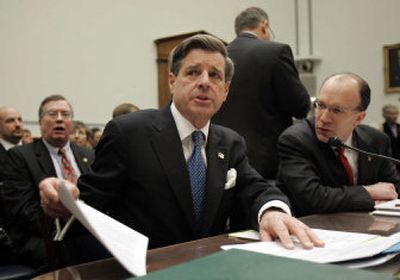Bremer defends Iraq spending

WASHINGTON – Democrats in the House of Representatives on Tuesday grilled the former U.S. administrator of Iraq, L. Paul Bremer, demanding that he account for billions of dollars distributed in Iraq that no one seems able to trace.
Much of the questioning focused on $12 billion – mostly in $100 bills packed in huge bundles, 363 tons of cash in all – from Iraqi oil sales and frozen assets of Saddam Hussein’s regime. The United States shipped the money to Iraq for Bremer’s organization to disburse to Iraqi ministries.
A government audit in 2005 found that $8.8 billion was turned over to the ministries without assurance that it would be properly used and accounted for. A House Committee on Oversight and Government Reform staff document issued Tuesday says that much of the money appears to have been lost to corruption and waste.
Oversight committee Chairman Henry Waxman, D-Calif., said that with no clear standards, it was possible that some of the money ended up in enemy hands.
Bremer acknowledged making mistakes but said that overall – given the violence and the sorry state of Iraq’s economy – he did the best he could. It was the first time he’d testified before Congress since he turned over Iraq to an interim government in 2004 after running the Coalition Provisional Authority for 14 months.
“Despite the chaotic situation we found in Iraq, I believe the CPA discharged its responsibilities to manage these Iraqi funds on behalf of the Iraqi people,” Bremer said. “I am proud of what we achieved.”
Bremer said he used the money to pay government workers their salaries and pensions. He said the Iraqi ministries didn’t have good payroll records but that he had to turn over the money they requested quickly because he didn’t want government employees to go without pay.
Rep. John Tierney, D-Mass., asked Bremer about reports that many of the 3,000 CPA staffers were recent American college graduates who got their jobs because of their loyalty to the Bush administration.
Bremer said it was difficult to get qualified people to work in Baghdad and that he wasn’t responsible for selecting them.
Since Iraq’s spiral downward into a violent insurgency and sectarian civil war, many analysts have blamed Bremer’s decisions to disband the Iraqi army and ban members of Saddam’s Baath party from public service as key reasons that anarchy emerged.
Bremer defended both decisions. He said the Iraqi army had been a vehicle of Saddam’s repression and that the Baath party was modeled on the Nazis – “all right out of Hitler’s playbook.”
He said he’d suggested that only top Baath members lose their jobs but that Iraqi politicians implemented the plan and “broadened it way out.”
The chairman of the de-Baathification committee was then-Pentagon favorite Ahmad Chalabi.